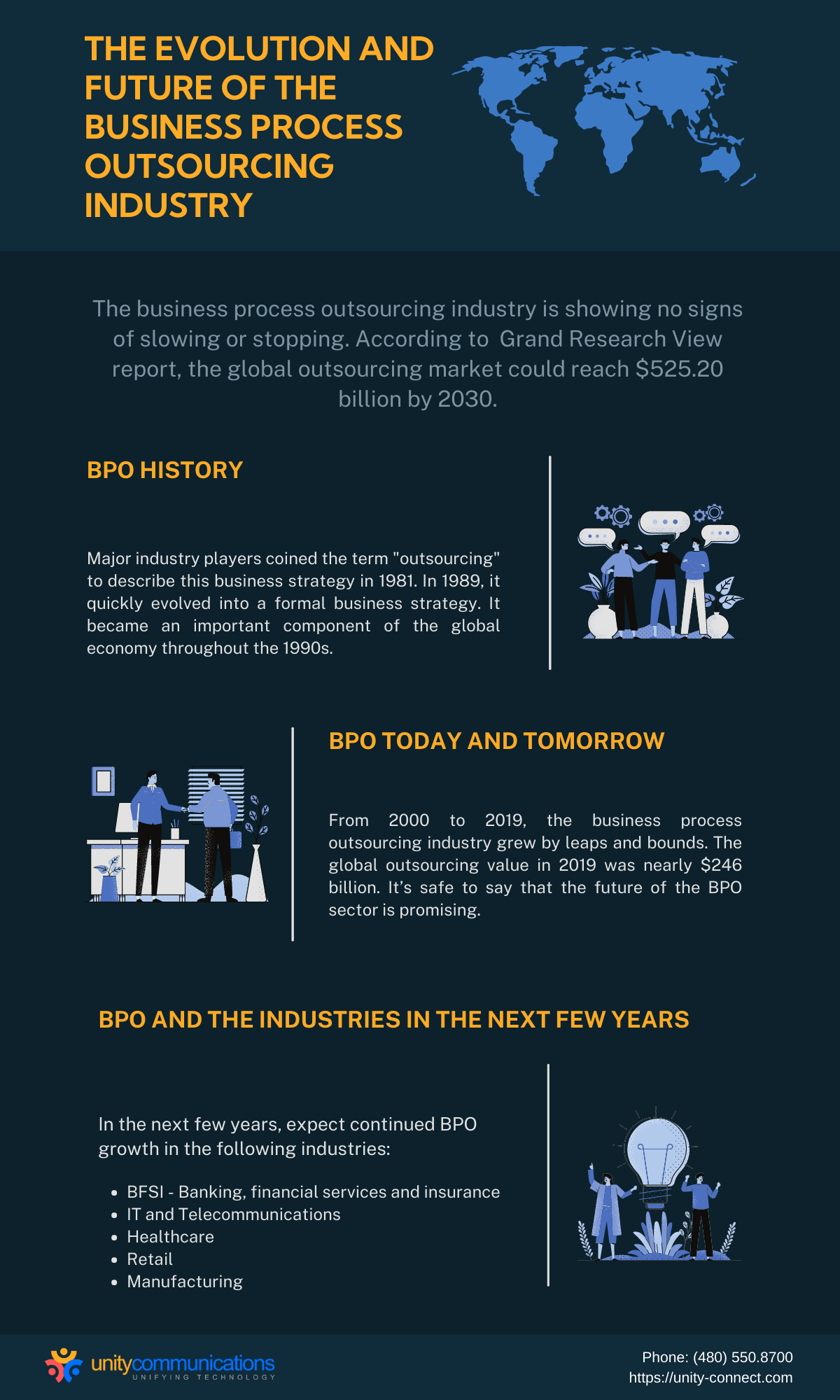Table of Contents
Business process outsourcing (BPO) has become a practical solution for businesses looking to ensure continuous operations, optimize workflows, and reduce operating costs.
Outsourcing for the first time, however, can be overwhelming. And even if you’ve long been outsourcing, you should evaluate your BPO practices, make any necessary changes, and make sure you have sound business decisions.
This page covers a comprehensive BPO guide. Learn how to outsource business processes, select a BPO company, and find out why you should consider outsourcing.
What Is Business Process Outsourcing?
To understand what business process outsourcing is, think about how you can partner with another company to ensure continuous operations. BPO allows another firm to handle some parts of your operations, whether business processes, functions, or specific tasks.
Instead of hiring people and investing in resources, you hire a third-party service provider to perform your business functions. A BPO company has the workforce, technology, and resources necessary to keep a business up, running, and fully operational.
For instance, let’s say your eCommerce business needs to build a solid workforce for your expanding market. Unfortunately, you face challenges in optimizing your customer service. An increasingly used business strategy, outsourcing lets you access global talent, a stable workforce, and resources for this front-office function.
Working with the right BPO company can improve customer service efficiency, quality, and productivity. It can even help you scale up and expand your eCommerce business.
How Do You Outsource Business Processes?

Outsourcing appears to be relatively straightforward. You identify business processes to outsource, choose a BPO company to work with, and start operating. However, there’s more to outsourcing than meets the eye.
Let’s further explore how to outsource business processes.
Types of Outsourcing
If you decide to outsource business processes, consider the outsourcing types below.
- Offshoring is outsourcing to an overseas BPO service provider. For example, a U.S.-based company contracts with a call center in Asia. Offshoring is ideal for reducing operating costs.
- Onshore outsourcing involves contracting with a BPO company in the same country. For instance, a Canada-based eCommerce business considers outsourcing financial services to an accounting firm in the same country. Startups and small companies typically use onshore outsourcing to grow and expand.
- Nearshore outsourcing is working with a BPO service provider in a nearby country. For example, a US-based tech company outsources to an IT firm in Mexico. This outsourcing type is best for cost reduction without compromising proximity and time zone compatibility and produces positive business process outsourcing results.
Business Functions to Outsource
Business process outsourcing covers a broad range of business functions, but below are the two primary types.
- The front office refers to client-facing business tasks in which employees work directly with customers. Common front-office functions are customer service (assisting customers), sales or telemarketing (promoting products or services), and technical support (troubleshooting).
- The back office isn’t client-facing at all. But back-office personnel perform essential administrative tasks and provide support services. Administrative functions include accounting, payroll, recruitment, human resources (HR), and legal affairs. In addition, back office support services are data entry, inventory management, and IT support.
Some industries outsource specific business processes, including:
- Order fulfillment and warehouse operation in eCommerce
- Plan underwriting and claims processing in health insurance
- Telehealth services and remote patient monitoring (RPM) in the medical field
- Escrow calculation and credit reporting in the mortgage industry
- Property listing and open-house scheduling in real estate
- Content creation and social media management for digital marketing
BPO Steps to Take
Now, let’s look at the actual processes of outsourcing from start to finish. If you’re looking to outsource business processes, take the following steps:
- Identify business problems: Outsourcing begins with some business challenges. Companies might confront high-volume messages, bulk order requests, staffing shortages, lack of technology, and limited resources. Before venturing into BPO, identify some problems you currently encounter in your business.
- Determine business functions for outsourcing: Once you identify some business problems, determine what particular tasks to outsource. They can be front-office tasks such as customer service and sales or back-office work such as data entry and IT support.
- Set business goals: Define your business objectives after identifying your problems and business functions for outsourcing. Ask yourself what you hope to achieve. Business goal-setting should be part of your BPO for long-term planning and execution.
- Research potential BPO companies: At this point, you can look for a BPO company. Start by researching, contacting prospects, and asking for contract offers. Then examine their credentials, resources, and pricing to decide which to hire.
- Negotiate and set a contract agreement: Once you have a prospective BPO company in mind, start negotiating. Ensure that all terms and conditions are favorable to both parties before settling the deal. You can then set a contract detailing the service level agreement.
- Execute BPO and implement business practices: After hiring a BPO service provider, it’s time to do the actual work. Make sure you communicate your business objectives to the provider and set key metrics. Ensure constant communication and collaboration. Finally, implement business practices to ensure continuous operations for the long term.
Key Factors in Choosing a BPO Company
Choosing the right third-party service provider is crucial to your BPO success. Select the one best suited for your industry, company size, business type, and functions to outsource. Also, decide whether to use offshore, onshore, or nearshore outsourcing.
Crucial factors to consider when looking for a BPO service provider include:
- Credentials: Start by researching prospective BPO companies. When checking their websites, portfolios, and company profiles, be particular about their credentials. See if they have the license to operate, business certifications such as the International Organization for Standardization (ISO) certification, and even BPO awards and accolades.
- Experience: Industry experience speaks volumes about BPO prospects’ competence and reliability. The longer they’ve been offering BPO services, the more reliable and competent they have most likely become. However, ensure your chosen provider has a good track record of providing clients with high-quality services.
- Expertise: BPO service providers vary. They handle various services and cater to different industries. Thus, check their fields of specialization. Make sure their areas of expertise match your business type and industry.
- Workforce: A reliable BPO company has a robust workforce that can contribute to your success. Check how knowledgeable and skilled their agents are. See if they have BPO learning centers for training employees and honing their skills.
- Resources: A reliable BPO service provider has all the necessary resources. Aside from office infrastructure, phone lines, and internet connectivity, check technologies used in BPO services. Pick an external vendor that incorporates current and emerging BPO trends such as automation, artificial intelligence (AI), and progressive web app (PWA).
- Reputation: The business reputation is a critical factor in choosing a BPO service provider. Check customer feedback and client testimonials on the providers’ websites and third-party outsourcing reviewers. What clients and customers have to say should matter the most. After all, they have already received the BPO services.
How Do Different Industries Use BPO?
Business process outsourcing caters to various industries with a growing scope of work. Grand View Research found that the global BPO market was worth almost $246 billion in 2021 and could grow at a CAGR of 9.1% from 2022 to 2030.
Below are commonly outsourced business functions.
- Customer service had the biggest revenue share of over 30% in 2021. Companies of all sizes outsource this business function handled via a call center, live chat, or email support. It registers the fastest CAGR from 2022 to 2030, which means that businesses will continue to outsource this business process.
- Finance and accounting accounted for one of the largest revenue shares in 2021. These will witness significant growth from 2022 to 2030 due to the increasing banking facilities and the industry’s regulatory requirements.
- Knowledge processing outsourcing (KPO) refers to outsourcing business processes while leveraging industry knowledge and expertise. Companies have begun using KPO and will continue to do so in the years to come.
- Procurement and supply chains are obtaining products or services and overseeing the flow. Companies will continue to outsource this segment because it’s integral to business operations. This segment covers business functions such as material acquisition, inventory management, order fulfillment, and shipping or delivery.
The study also revealed that North America (the US, Mexico, and Canada) owns the biggest chunk of the BPO market at a 36% share in 2021, followed by Europe and the Asia Pacific (touted to hold the highest CAGR from 2022 to 2030). BPO companies located in regions such as Latin America, the Middle East, and Africa (MEA) complete the picture.
The report further analyzed the BPO market based on the end-use factor. Here’s how the industries currently use and will use BPO services in the coming years:
IT and Telecommunications
Grand View Research reported that the IT and telecommunications segment covered 34% of the BPO market share, the largest in 2021. Consider the rising numbers of IT companies worldwide and the rapid global industrialization. The increasing demand for internet connectivity, network security, and technological innovation has driven this growth.
In addition, many telecommunications companies have long been outsourcing. They hire various BPO services, ranging from as simple as customer service to as complex as billing and collections. They outsource to reduce operating costs, attain business flexibility, access resources, and boost current investments.
Banking, Financial Services, and Insurance (BFSI)
While the IT and telecommunications segment holds the largest revenue share, the BFSI sector is the fastest-growing segment. Many financial entities heavily rely on BPO service providers for cost-efficiency.
BPO encompasses commonly outsourced business processes such as customer service, billing and collections, and sales. Financial institutions might eventually outsource asset and management investments in the next few years.
Healthcare
The healthcare sector has also ventured into outsourcing. Medical centers, hospitals, outpatient facilities, diagnostic centers, laboratories, and clinics have long used BPO services. Healthcare businesses outsource parts of their operations, such as patient appointment scheduling, medical billing, claims to process, and records management.
The pandemic was also a game-changer in the industry. It led to the rise of outsourcing telemedicine, telehealth services, and remote patient monitoring (RPM).
Retail and Ecommerce
Retail outsourcing has become increasingly popular around the world. Retail companies outsource business processes such as sales or telemarketing, order fulfillment, and product shipping.
In recent years, however, the eCommerce sector has boomed. Many entrepreneurs have launched online businesses; even brick-and-mortar stores have transitioned to click-and-mortar businesses. To ensure successful operations and meet consumer needs, they turn to outsource.
Manufacturing
Manufacturing outsourcing is among the pioneers in the BPO industry. It started in the 1950s when many businesses used outsourcing to leverage other companies’ resources. Companies then were not as complex and multifaceted as they are today.
In recent years, the global manufacturing outsourcing market has grown exponentially. Manufacturers entrust 70% to 80% of their finished products to third-party service providers. They also outsource operations such as assembling parts.
In addition, a recent report revealed that 84% of companies turn to outsource manufacturing, and 25% outsource over half of their manufacturing processes. The drivers for this BPO endeavor include:
- Reducing manufacturing costs
- Leveraging expertise
- Increasing business agility
- Accessing product designs
- Ensuring regional or local expansions
How Do Companies Use BPO Services?
Explore below how companies in different industries use outsourcing.
- American Express (BFSI): Amex is a global financial institution. While it provides banking services, it also offers non-card services such as traveler’s checks and financial advice. Aside from front-office functions, it’s one of the pioneers in establishing overseas back-office facilities.
- International Business Machines (IT): IBM is a giant tech company operating in some parts of the world. As one of the biggest global employers, this company has outsourced 70% of its employees. Outsourcing business processes include IT support, network management, and infrastructure setup.
- UnitedHealth Group (Healthcare): This health insurance company is the largest insurance carrier in the United States, providing insurance policies to both employers and individuals. This segment outsources such business functions as underwriting, customer service for benefit inquiries, and even claims processing.
- Walmart (Retail): While Walmart is a household name in the United States, it operates 12,000 stores in several countries under different names. Aside from exporting products, the company outsources finance and accounting, order fulfillment, inventory management, and warehouse operations.
- Amazon (Ecommerce): Amazon is one of the largest eCommerce companies globally. Its BPO has expanded from online retail to cloud infrastructure and consumer electronics. It will continuously cater to global consumer needs.
- The Coca-Cola Company (Manufacturing): This company is the best example of manufacturing outsourcing. It now has over 500 beverage brands outsourced to bottling partners globally. That’s why Coke is the most popular beverage in the world.
Why Do Companies Choose To Outsource Business Processes?
Companies outsource business processes for several reasons, including:
- Cost reduction: The Deloitte Global Outsourcing Survey revealed cost reduction as the top reason for outsourcing. Cost used to be only secondary to such business objectives as achieving business agility and boosting service quality. Now, cost savings top the list of reasons most companies outsource.
- Focus on core business: Many companies outsource parts of their business operations to have time and energy for business growth and expansion. A survey showed that 49% of polled companies turn to IT outsourcing to focus on core functions. Scaling up is best when outsourcing to a reliable BPO company.
- Access to a global workforce: Apart from cost reduction (59%) and focus on core functions (57%), 28% of companies outsource to access a global workforce. They hire expert talent and use their knowledge and skills. After all, a robust workforce can translate to business growth and success.
- Technology and resources: BPO companies allow their clients to use their technology and resources. Time Doctor notes that almost half of businesses use outsourcing to solve capacity issues. These resources can help streamline workflows and optimize business processes to accommodate clients or customers.
- Improved business performance: Another practical reason for outsourcing is to improve service efficiency, quality, and overall productivity. Clutch revealed that 24% of small businesses outsource to increase efficiency. This year, startups will likely be the new BPO customers as they seek to grow and expand.
- Business growth and scalability: Outsourcing boils down to scalability and business growth, especially for startups and small businesses. Another Clutch survey confirmed that 19% of small companies outsource to support business scalability. BPO indeed proves to be an effective business growth strategy.
What Are the Risks of Outsourcing?

Business process outsourcing isn’t the ultimate panacea for all business problems. Outsourcing also comes with risks, especially if you make wrong BPO decisions and work with the wrong BPO partner.
After discussing the top reasons for outsourcing, let’s look at some BPO risks you should be wary of.
- Cost underestimation: As mentioned above, cost reduction is the primary reason for outsourcing. But without research and due diligence, a business can fall prey to some hidden costs associated with BPO. Underestimation defeats the purpose of outsourcing.
- Partnership challenges: Offshoring and nearshore outsourcing come with relationship challenges. On top of these are communication issues and cultural barriers confronted by many businesses. Hiring the right BPO company and working on the relationships are crucial to ensuring a robust BPO partnership.
- Compliance with regulations: Adherence to existing rules and regulations proves challenging, especially when outsourcing to nearshore or offshore BPO companies. Your BPO operations will be subject to the country’s policies, where you must always stay compliant. When you outsource business processes, make sure to do your homework.
- Overdependence: Some companies entrust some parts of their operations to external vendors. However, they become overly dependent on their BPO service providers, which can be risky for their businesses. Understand that outsourcing means pursuing partnerships and working toward common goals.
- Security risks: Entrusting your business operations to a third-party service provider might put your security at risk. You might expose your company data, customer information, and business processes to cyberattacks and an unreliable BPO vendor. Hence, pick a BPO company with solid security measures in place.
- Business disruption: Outsourcing can make your business operations vulnerable to such disruptions as workplace hazards, geopolitical instability, economic changes, and natural disasters. When outsourcing business processes, the best action is to set contingency plans for business disruptions.
The Evolution and Future of the BPO Industry

The business process outsourcing industry shows no signs of stopping or even slowing down. Another Grand Research View report states that the global outsourcing market might reach $525.20 billion by 2030.
A Glimpse of the BPO History
What started as manufacturing outsourcing in the 1950s has become a robust sector, catering to various industries.
In 1981, major players in the industry coined ‘outsourcing’ to refer to this business strategy. It quickly turned into a formal business strategy in 1989. Throughout the 1990s, it became a vital component of the global economy.
BPO Today and Tomorrow
The business process outsourcing sector has grown by leaps and bounds from 2000 to 2019. As previously mentioned, it had a global outsourcing value of nearly $246 billion in 2019. The drivers of BPO growth in recent years are:
- Operating cost reduction
- Focus on core functions
- Business flexibility and agility
- Service quality, efficiency, and productivity
- Business growth and scalability
It’s safe to say that the future of the BPO sector is promising. Businesses of all sizes should keep up with the existing and emerging BPO trends, including:
- Use of technology: As early as this year, consider investing in the latest digital tools and technologies. These include robotic process automation (RPA), artificial intelligence (AI), and progressive web app (PWA). Also, incorporate cloud computing, omnichannel solutions, and social media management into your BPO services.
- BPO professionals’ career advancements: Companies should use BPO service providers that focus on their workforce’s career growth. Pick a BPO company that provides knowledge enhancement and upskilling for BPO professionals.
- Startups and small businesses as BPO customers: No longer do only large corporations capitalize on BPO services. Small businesses now use third parties’ workforce, technology, and resources. Startups must hire BPO services to start right and sustain their businesses for the long term.
- Continued growth in top outsourcing destinations: Major players in the BPO industry continue to outsource. Top outsourcing countries are even looking to grow and expand. BPO companies in North America and Europe will use nearshore outsourcing, while those in the Asia Pacific region will focus on offshoring.
- Move to Latin America as new BPO hubs: Some Latin American areas have recently become ideal BPO hubs for onshore outsourcing. Companies can take advantage of location proximity and time zone compatibility by outsourcing to Brazil, Mexico, Argentina, and the US territory of Puerto Rico.
- Transparent business partnerships: BPO today goes beyond entrusting non-core business operations to third-party service providers. BPO companies contribute to their client’s business decisions transparently. They are now considered business partners that can be instrumental to a business’s overall success.
BPO and the Industries in the Next Few Years
In the next few years, expect continued BPO growth in the following industries:
- BFSI: Financial institutions will continue to expand their BPO endeavors, possibly outsourcing portfolio investment management. The global finance and accounting market might have a CAGR of almost 6% by 2026, potentially reaching $53.40 billion in the same year.
- IT and Telecommunications: This segment is the fastest-growing sector in outsourcing. Specifically, global IT outsourcing might hit $587.30 billion by 2027, with a CAGR of 8.26%. In addition, telecommunications companies will continue to outsource business functions, including customer service, billing, and finance and accounting.
- Healthcare: The pandemic has accelerated the BPO growth of this segment. Take, for instance, the rise of telemedicine and the availability of health insurance plans to respond to the global health crisis. The global healthcare BPO market could hit $468.5 billion by 2026, with a CAGR of 9.6%.
- Retail: Global retail sales are expected to reach around $31.7 trillion by 2025, with BPO contributing to the market. Ecommerce, in particular, will grow exponentially in the next few years, triggered by the pandemic. As this sector grows and the market expands, expect online entrepreneurs to use outsourcing.
- Manufacturing: This segment is one of the pioneers in outsourcing and has continued to take advantage of BPO services. The global manufacturing market might grow from $86.7 billion in 2020 to $117.7 billion by 2025.
What Do You Consider for Setting and Maintaining a BPO Agreement?
Establishing and sustaining a BPO contract agreement is crucial to your outsourcing success. Hence, think very critically and strategically about this agreement once you’ve decided to hire a BPO service provider. Key things to stipulate in the contract include:
- Business objectives: As a business, ask yourself what you hope to achieve from BPO. Is it to build your workforce, improve your service level, satisfy your customers, increase your sales, win new clients, or grow your business? You should clearly define and include your business goals on your BPO contract.
- Key metrics: Key performance indicators (KPIs) guide a provider in handling your business functions. Be very specific with your metrics when drafting your service level agreement. Customer service metrics, for instance, should include service efficiency (AHT and FCR), quality (QA scores and compliance), and customer feedback (CSAT).
- Clear policies and BPO instructions: Every business has its set of rules and regulations. You should draft clear policies for your BPO service provider when outsourcing business processes. Also, provide clear instructions for your BPO company to follow.
- Communication and collaboration: These elements are the key to BPO success. Once you hire a BPO service provider, never leave your business operations to them without involving yourself in their decisions and undertakings. Outsourcing means pursuing business partnerships—communicating and collaborating with them regularly.
- Trust and confidence: Hiring a BPO company means you’ve done enough research, had critical thinking and made solid decisions. You should then put your trust and confidence in your service provider. While you regularly collaborate with them, give them the liberty to decide and implement business practices.
- Workforce: To meet the service level agreement, examine your BPO company’s employees. Ensure they meet the headcounts required to perform the tasks. Most importantly, they must pass stringent recruitment screening, receive proper onboarding, and undergo regular training.
- Technology and resources: The material resources help optimize processes and scale up a business. Make sure to factor in the technologies used in the BPO operations, from phone lines and internet connections to digital tools such as automation, AI, and PWA. Lastly, check other resources necessary to keep your business up and running.
- BPO results: The most important part of outsourcing is the results your BPO service provider delivers. Obtain regular reports from your provider to see if they meet the service level agreement. Most importantly, offer assistance, support, and help recalibrate business strategies for some areas of improvement.
How To Get Started With Outsourcing Through Unity Connect

At this point, we’ve tackled almost everything you need to know about outsourcing. It’s time to get started with your BPO initiatives by following these crucial steps:
- Identify challenges in your business operations
- Determine business functions to outsource
- Establish your BPO goals or objectives
- Start looking for a BPO service provider
- Screen outsourcing prospects
- Decide on a BPO partner to hire
- Set your service level agreement
- Sign the BPO contract
- Let your BPO service provider work on your business processes
Are you looking to outsource business processes? Unity Connect is here to help you with your outsourcing.
Since 2009, we’ve provided BPO services to businesses, from startups to large enterprises. Apart from general BPO services, we also specifically offer data entry, IT support, and eCommerce customer support. Get in touch with us today to see how we can help!
The Bottom Line
Business process outsourcing has long gained ground and proven beneficial to companies of all sizes. It enables you to reduce operating costs and focus on your core business functions. It also gives you access to a robust workforce, the latest technology, and the resources necessary to succeed in business.
However, outsourcing business processes is no easy feat; it requires careful planning, conscious efforts, and deliberate action, especially if you’re outsourcing for the first time. Even if you’ve been outsourcing for a long time, you should reevaluate and recalibrate your BPO practices.
Make sure to follow this comprehensive guide on outsourcing business processes to start off on the right foot and scale for your business.




